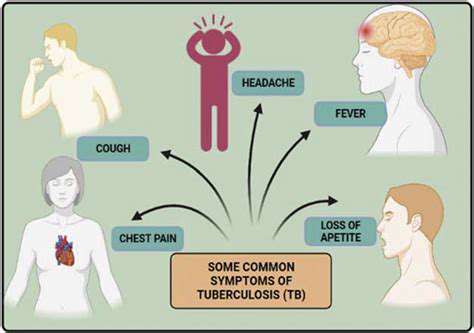Early Recognition of Health Symptoms: A Guide to Proactive Care
Why Early Detection Matters
Understanding the Benefits of Early Detection
Early detection of health symptoms is crucial because it significantly increases the chances of successful treatment. When health issues are identified in their initial stages, the range of treatment options typically expands. This allows healthcare providers to choose the least invasive and most effective therapies available.
Moreover, early identification can lead to better health outcomes. For many diseases, such as cancer or heart disease, catching the condition early can mean the difference between a minor procedure and a major surgery, or even between life and death.
Early detection also plays a vital role in managing chronic illnesses. By recognizing symptoms early, individuals can make lifestyle changes or seek medical interventions that keep their conditions from worsening.
Preventative care and early detection can also help in reducing healthcare costs. Treating conditions at an early stage often requires fewer resources and less intensive medical interventions, which can translate into significant savings for both patients and healthcare systems.
Finally, being proactive about health through early detection not only encourages individuals to take control of their own health but also fosters a culture of openness and awareness about health issues. This can lead to better health education and community support initiatives.
Common Signs and Symptoms to Monitor
Recognizing the early signs of health issues is fundamental to proactive care. Common symptoms to watch for include persistent fatigue, unexplained weight changes, or sudden changes in mood. Being aware of these indicators can encourage individuals to seek medical advice sooner rather than later.
Another key symptom to note is chronic pain. If discomfort occurs regularly and does not have a clear cause, it is crucial to consult a healthcare provider. Early evaluation can help identify underlying conditions before they escalate.
Changes in appetite or eating habits can also be significant indicators of underlying health issues. Whether it's a loss of appetite or unexplained cravings, these changes warrant further investigation.
Additionally, any unusual skin changes, such as new moles, rashes, or discoloration, should be monitored closely. Skin health can be an important reflection of overall well-being and can indicate a variety of conditions.
Lastly, mental health symptoms, including prolonged sadness or anxiety, should not be ignored. Early intervention in mental health can prevent more severe mental health crises and improve overall quality of life.
Common Symptoms to Watch For

Physical Symptoms that Require Attention
Being aware of physical symptoms is essential for maintaining good health. Certain indicators may signal an underlying condition requiring prompt attention. Common symptoms include persistent pain, fatigue, and noticeable changes in weight. If you experience unexplained symptoms, consider seeking medical advice sooner rather than later. Maintaining a symptom diary can help you track and communicate your experiences effectively.
Headaches, for instance, may range from mild discomfort to debilitating pain. When they occur frequently or change in intensity, it's crucial to evaluate potential causes. Additionally, unexplained bruising or bleeding can hint at more serious health issues. Recognizing the significance of these outward signs is a key aspect of proactive healthcare.
Skin changes, such as new moles or alterations in existing ones, should also be monitored. These could be indicative of various skin conditions, including potential malignancies. Furthermore, persistent cough or changes in respiratory functions warrant attention, as they may signify respiratory infections or conditions like asthma.
Gastrointestinal issues, such as ongoing nausea or changes in bowel habits, can be alarming. These signs should never be dismissed, as they could lead to serious complications if ignored. It's imperative to listen to your body and seek evaluations for physical symptoms that linger or worsen over time.
Mental Health Symptoms to Be Mindful Of
Mental health is just as crucial as physical health, yet it often goes unnoticed. Symptoms such as prolonged sadness, anxiety, or mood swings can greatly impact your quality of life. Understanding these mental health signs is vital for ensuring your overall well-being. Be open to discussing your feelings with trusted friends or professionals.
In addition to emotional disturbances, changes in sleep patterns can indicate mental health issues. Sleep disturbances may lead to fatigue and exacerbate the cycle of poor mental health. Recognizing these patterns is a significant step in addressing your mental state.
Loss of interest in activities once enjoyed can also be a red flag for mental health concerns. This symptom may suggest underlying conditions such as depression. It is important to take these changes seriously and seek help if needed.
Furthermore, difficulties in concentrating or experiencing constant feelings of unease can signal deeper issues. Being proactive in recognizing these signs can lead to timely intervention and support. Ultimately, prioritizing mental health is essential to living a balanced and fulfilling life.
Listening to Your Body

Understanding the Signals
Our bodies are constantly sending us signals that indicate whether we are thriving or should take action. Listening attentively to these signals can play a crucial role in maintaining our health. Symptoms such as fatigue, headaches, or unusual pains can often be dismissed, but they can be key indicators of underlying issues. By recognizing these signs early on, individuals can seek appropriate care and prevent potential complications down the line.
Each symptom has its own meaning and can vary in significance based on individual health contexts. For example, consistent fatigue may not just stem from a busy lifestyle; it could indicate nutritional deficiencies or sleep disorders. Being aware of what these signals might suggest is essential for proactive health management.
Monitoring your body's patterns over time is another effective way to remain attuned to its needs. Keeping a symptom diary can help track not just what is experienced, but also when and under what circumstances. This can provide valuable insight into personal health and alert you and your healthcare provider to changes that may warrant further investigation.
In conclusion, understanding the signals your body is sending can empower you to take charge of your health. Stay observant and proactive, so you can address issues before they escalate into more serious conditions.
Common Early Warning Signs
There are several common symptoms that should never be ignored. Unexplained weight changes, persistent coughs, or changes in bathroom habits can be warning signs of larger health issues. It is critical to trust your instincts and seek medical advice when you notice something out of the ordinary.
Skin changes, such as new moles or changes in existing ones, can also be significant and warrant attention. Furthermore, emotional changes, including prolonged feelings of sadness or anxiety, may indicate underlying health concerns that need to be addressed. Recognizing these signs can lead to timely interventions and better health outcomes.
Digestive issues like bloating, constipation, or frequent heartburn can be early indicators of food intolerances or gastrointestinal disorders. Early identification of such symptoms can help mitigate further complications and allow for necessary lifestyle changes. Always consult with a healthcare professional if symptoms persist.
Overall, being proactive about these common early warning signs can help you lead a healthier and happier life. The sooner you address them, the better your chances of preventing more complex health issues.
The Role of Routine Check-ups
Routine check-ups play a significant role in health management and early detection of potential issues. Regular visits to your healthcare provider can help catch problems before they become serious. These appointments are opportunities to discuss any symptoms you’ve been experiencing, ensuring that nothing is overlooked.
During check-ups, healthcare providers may perform various tests and screenings that can reveal underlying conditions. For instance, blood pressure checks, cholesterol screenings, and cancer screenings can all provide crucial information about your overall health status. It's essential to adhere to recommended schedules for these checks based on your age and health history.
In addition to physical exams, routine check-ups can also allow for discussions about lifestyle changes that may promote better health. Your provider can offer tailored advice on diet, exercise, and stress management strategies that can help mitigate potential health risks. This proactive approach encourages individuals to take an active role in their well-being.
In summary, regular health check-ups are vital for early recognition of health symptoms and the promotion of overall wellness. They can greatly aid in the prevention and early intervention of health issues, leading to improved long-term health outcomes.
When to Seek Professional Help
Knowing when to seek professional help can be challenging but is a crucial aspect of proactive health care. If symptoms persist for an extended period or worsen over time, it’s essential to consult with a healthcare professional. Ignoring persistent symptoms can lead to more severe health issues that could have been avoided with early intervention.
In addition to duration, the severity of a symptom plays a significant role in determining whether to seek help. Symptoms that impact your ability to function or perform daily activities should be investigated promptly. For instance, an intense headache or sudden vision changes may require immediate medical attention.
Furthermore, any sudden changes in your health, such as pronounced dizziness, confusion, or difficulty breathing, should be treated as emergencies. It’s better to err on the side of caution and seek help immediately when it comes to sudden and severe symptoms. Early intervention can save lives.
Ultimately, staying informed and proactive about your health is key. By being vigilant about when to seek professional help, you can ensure that you receive the care needed to address your health concerns effectively.
Seeking Medical Advice
Importance of Early Intervention
Recognizing health symptoms early can significantly influence treatment outcomes. The sooner a medical condition is identified, the more options there are for effective intervention. This proactive approach not only improves individual health but can also reduce the overall burden on healthcare systems.
Many conditions are more easily managed or even completely resolved if caught in their early stages. For instance, some chronic diseases can be controlled with lifestyle changes or medications if diagnosed promptly, thus preventing complications that could lead to hospitalization.
When to Seek Help
Understanding when to seek medical advice is crucial for maintaining health. If you experience persistent symptoms such as unexplained fatigue, weight changes, or prolonged pain, it's important to consult a healthcare professional. These symptoms could indicate underlying health issues that require prompt attention.
Additionally, paying attention to changes in your body—such as new lumps, skin changes, or abnormal bleeding—should prompt a medical evaluation. Early consultations can lead to timely referrals to specialists if necessary, ensuring comprehensive care.
Effective Communication with Healthcare Providers
When seeking medical advice, clear communication with your healthcare provider is essential. Articulating your symptoms accurately can help in diagnosing the issue more effectively. Make it a habit to note any changes in your health, including the duration and intensity of symptoms, to provide a thorough overview during consultations.
Moreover, don’t hesitate to ask questions about your symptoms and the proposed treatment plans. Engaging in an open dialogue fosters a better understanding of your health situation and can empower you to take an active role in your care.

